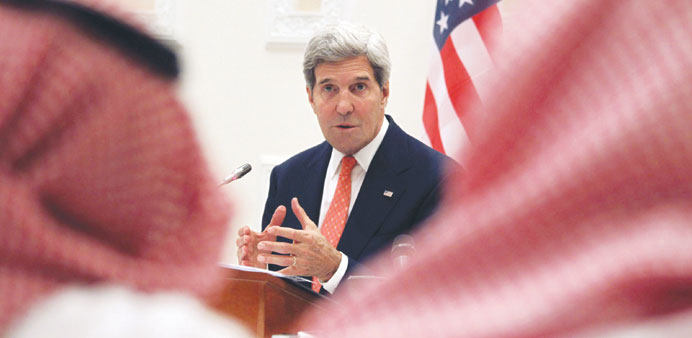|
US President Barack Obama is under pressure abroad, and Secretary of State John Kerry has been deployed as a fireman to damp down various diplomatic troubles around the world. |
Kerry’s travel plans are exhausting even to look at. He’s visiting nine cities in the Middle East, Europe and North Africa by November 11.
And he is expected to have to endure unpleasant talks in every one of them.
Many allies of the US are annoyed with Washington, be it over the espionage allegations surrounding the National Security Agency (NSA), US policies on Syria and Iran, or on progress in the Middle East peace process.
Kerry, 69, has his work cut out.
In the US itself, many people believe their country is not doing well on the diplomatic front these days. Support for Obama’s foreign policy stands at less than 39%, the lowest in his almost five-year presidency, the website Real Clear Politics says, drawing an average of recent opinion polls.
And yet Obama is caught up in domestic issues from healthcare reform to fiscal problems - so much of the damage limitation work beyond the country’s borders falls to Kerry.
“The secretary, overall, believes that rolling up his sleeves and having personal diplomacy is the way that we should continue to approach issues we work together on, global challenges, or issues where there may be concerns,” his spokeswoman, Jennifer Psaki, said as she presented Kerry’s plans to the media.
His schedule included Egypt, Saudi Arabia, Poland, Israel, the West Bank, Jordan, the United Arab Emirates, Algeria and Morocco.
Surprisingly, the trip started in Cairo, which no such senior US official had visited since Islamist president Mohammed Mursi was ousted by the military in July.
The fact that Egypt was not originally on Kerry’s official plan speaks volumes: although the US government does not regard the ousting of the democratically-elected Mursi as a coup, it still suspended aid for the Egyptian military.
There is substantial tension between the two parties, which had been close allies until now.
Saudi Arabia appears to want some clarity, too.
Riyadh is annoyed by Washington’s Syria policy. The US decision not to carry out a military strike on Syria as punishment for the use of chemical weapons blamed on the regime of President Bashar al-Assad has been puzzling to many in Saudi Arabia.
“Saudi Arabia has put pressure for months on the international community to intervene, (in Syria) only to see the US and international community giving even more time to a regime that has yet to show any willingness to respond to, or respect, international law,” said Salman Shaikh, director of the Qatar-based think tank Brookings Institute Doha Centre.
In an unprecedented move, Saudi Arabia refused a seat on the UN Security Council two weeks ago. The reason, according to the Saudi government, was the council’s “double standards” and the inability of the UN body to actually solve conflicts, for example in Syria.
When Kerry gets to Poland, he will doubtless face difficult questions from European allies on the espionage scandal around the NSA.
And on his visits to Israel and the Palestinian territories, things will hardly get easier.
Kerry wants a successful peace process, and he recently sat with Israeli Prime Minister Benjamin Netanyahu for seven hours.
However, Netanyahu is increasingly concerned over US policy regarding Iran.

